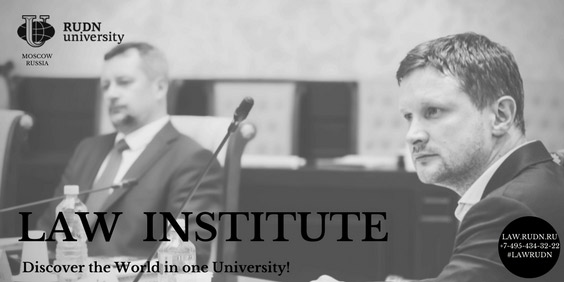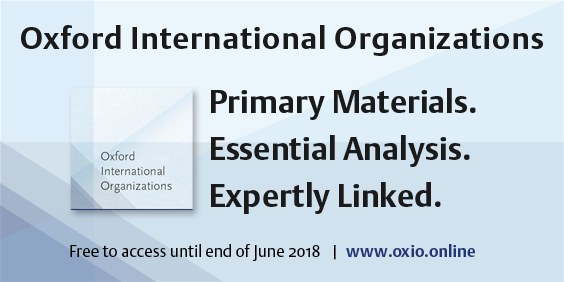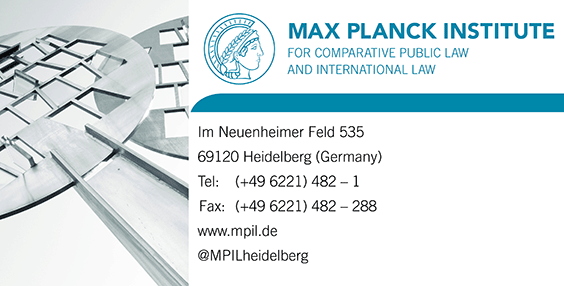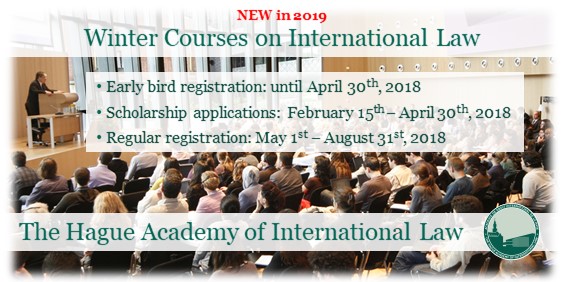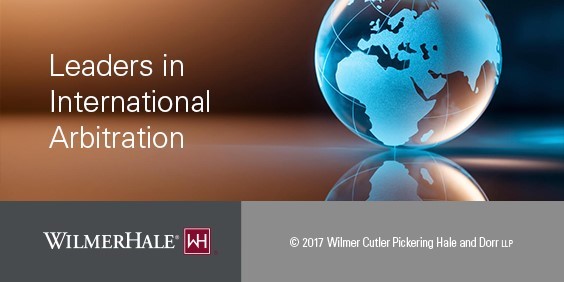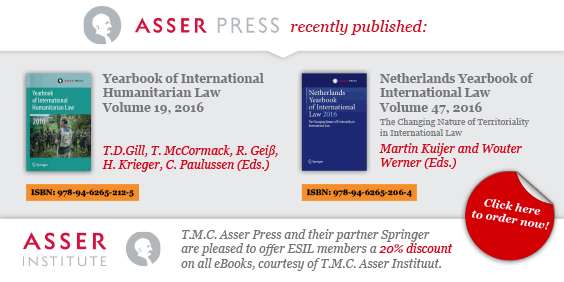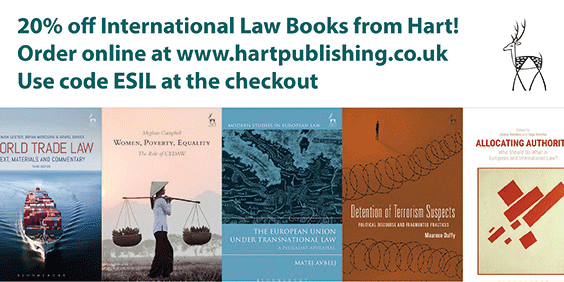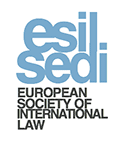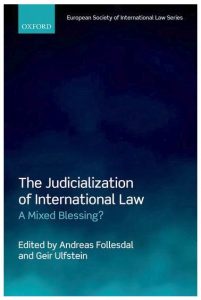ESIL Newsletter: March 2018
 In this issue
In this issue
- President’s Message: ESIL – An Active Society
- Guest Editorial by Elena Cirkovic: Ice, space, and the final frontier of international law’s universality
- 2018 ESIL Annual Conference
- Forthcoming ESIL-sponsored events
- 2018 ESIL Research Forum – Report
- First volume in the ESIL Series
- ESIL Reflections
- News from ESIL Interest Groups
1. President’s Message: ESIL – An Active Society
 Luis M. Hinojosa-Martínez
Luis M. Hinojosa-Martínez
Let me begin this message by highlighting the launch of a project developed over a long period of time in the engine room of the Society: the European Society of International Law Series. This collection, published by OUP, includes selected excellent papers presented at ESIL events. The first volume in the Series, ‘The Judicialization of International Law. A Mixed Blessing?’ (the same title as the 2015 ESIL Annual Conference in Oslo), has been edited by Andreas Follesdal and Geir Ulfstein, although many members of the Society have been involved in the publication as peer reviewers or Series Editors (in relation to this volume, I should mention the excellent coordination of Anne van Aaken). The book contains some of the outstanding papers presented at the Oslo conference and provides a precise analysis of the effects that the increasing number of international courts and tribunals is having on the interpretation, implementation and even the conceptualization of international law (see below in point 6 of this Newsletter). The second and third books in the Series are already in the pipeline (‘The European Convention on Human Rights and General International Law’ edited by Anne van Aaken and Iulia Motoc, and ‘How International Law Works in Times of Crisis’ edited by George Ulrich and Ineta Ziemele). I wish this Series a long and productive life.
The 2018 ESIL Research Forum at the Hebrew University of Jerusalem (27 February-1 March) was a success in terms of attendance, quality of the presentations, and the organizational skills of the hosts. The subject of the Forum (‘International Law in Times of Disorder and Contestation’) allowed a transversal line to be drawn that cut across very different subjects that pose challenging questions and show the tensions that international law has to face nowadays. Publication of some of the papers presented at the Forum in the ESIL SSRN Series and in the Israel Law Review will throw a fresh new light on research on two topics in particular which were discussed in several of the presentations: the (de)legitimization of international courts and the particularities of the inter-American system of protection for human rights. As regards to the first subject, the perspectives of those defending a defused pluralist approach to international adjudication contrasted with the participants who proposed methodological frameworks and concrete strategies to minimize backlash against international courts’ decisions. In this context, several speakers used the very interesting and creative case-law of the Inter-American Court of Human Rights on ‘other forms of reparation’ for non-pecuniary damages to illustrate (and propose solutions to) the backlash problem.
In addition to the main programme, the organizers arranged a study tour that helped participants to better understand the Israeli/Palestinian conflict and they also enriched the RF with additional events: a seminar on the ‘Practice of International Law in a Conflict Zone’ and a Masterclass session by Larry Helfer on ‘Treaty Exit’. The ESIL Interest Group on International Environmental Law arranged an interesting side event on Sustainable Development, Climate Change and Environmental Protection that complemented a very full agenda. Finally, it is relevant to remember that none of the facilities of Hebrew University where the Research Forum took place were on occupied territory and that no Israeli government officials participated in the event. In addition, it has been agreed by the Board that ESIL will seek to co-organize an event in Palestinian territory in the near future.
The preparations for our next Annual Conference (Manchester, 13-15 September 2018) are in full swing. The conference will deal with ‘International Law and Universality’. In times when nationalism is rising around the world and some of the core elements of international institutions and of the international legal order are being questioned, the issue of universality is particularly topical and relevant. Those members who still believe that international law has evolved from a law of autonomous sovereigns to a law of an integrated world community really have to go to Manchester to defend that position. You can see the interesting draft programme online. Registration is now open and early-bird registration with reduced fees ends on 30 April.
Our very active Interest Group on International Environmental Law is co-organizing at Masaryk University, Telč (Czech Republic) a seminar on ‘Contemporary Challenges to International Law and Policy on Sustainable Development, Energy, Climate Change, Environmental Protection, Intellectual Property and Technology Transfer’ (19-21 April). In addition, as you will see below, several Interest Groups have already launched their Calls for Papers for pre-conference events in Manchester: the IG on International Bio Law on ‘International Bio Law and Universality: The Role of International Organizations and International Courts’, the IG on International Business & Human Rights on ‘Rethinking limited liability in light of the universality of human rights’, the IG on IHRL on ‘The Universality Challenge to Human Rights Law: a Sword, a Shield, or Neither?’, and the IG on International Courts and Tribunals is organizing a workshop on Access to International Adjudication.
There are three ESIL Lectures scheduled for the busy month of April: Attila Tanzi, ‘The Prevention and Settlement of Hydroelectric Industry Related Disputes under International Law: A Multi-Layered Approach’ (5 April); Veronika Fikfak, ‘Monetising Human Rights’ (13 April); Ekaterina Trendafilova: ‘The Kosovo Specialist Chambers as a New Model of Transitional Justice in the Balkan Region’ (24 April). They follow the recent ESIL Lecture by Lorenzo Gradoni on the ‘Position and Agency of the WTO Dispute Settlement System in the Fragmented World of International Adjudication’ already available on our website. We would like to encourage all members to make proposals for ESIL Lectures to Philippa Webb and Fulvio Palombino following the procedure established on our website.
In parallel, may I also ask our members to recommend new ESIL Reflections to Jean d’Aspremont if you would like to contribute? All ESIL members receive these peer-reviewed Reflections that enjoy a considerable international impact.
In these and other activities ESIL is dependent on its members. The 2018 membership campaign has been launched with a new fee structure that aims to facilitate the engagement of internationalists from low- and middle-income countries with the Society. Please help us to disseminate information about the new fees among your colleagues in such countries. This will increase the diversity and plurality of our scientific debates and will reinforce ESIL’s universal outreach.
I am looking forward to meeting you at a future ESIL event,
Luis M. Hinojosa-Martínez
hinojosa@ugr.es
2. Guest Editorial: Ice, space, and the final frontier of international law’s universality
by Elena Cirkovic, Ph.D., Associate Professor, National Research University / Higher School of Economics, St. Petersburg
Questions of physical space and international law have become prominent with novel extensions in the appropriation of human bodies, the sea, or outer space. New technologies have allowed for the commercialization of outer space, for instance, as well as the increasingly melting Arctic area. These issues are challenging our existing notions of territoriality, ownership, and borders, as well as the claims to international legal universality.
International law currently appears to function in tension with a variety of processes, which it cannot easily control. For instance, we can observe this in the challenge posed by climate change or the human exploration and use of outer space. A more traditional challenge stems from the contradiction between international law’s aspirations to universality and the parochial interests of states.
Climate change scientists have suggested that there is a high likelihood that the Arctic sea ice cover will get thinner and continue to shrink. The current international legal mechanisms are not sufficiently equipped to respond to such changes as they attempt to define processes such as the extensive methane venting to the atmosphere from sediments of the East Siberian Arctic shelf. At the same time, the Arctic states are rushing to extend their claims to continental shelves which would allow them to better access profitable resources in the near future.
In addition to the climate change-induced opportunities for future resource extraction, commercial interests are also expanding into outer space. SpaceX’s Falcon Heavy, the world’s most powerful rocket now launched into space, could facilitate further activities in space including the mining of near-Earth asteroids. However, the Outer Space Treaty (OST) and the Moon Treaty are legacies of the Cold War, with the corresponding ambiguities in their texts, as the two competing powers, the Soviet Union and the United States, could not agree on many issues. International law in outer space lacks certainty and allows for openness for the private and commercial space sector. While human activity in space is already present, it is not an easily predictable environment.
Environmental and ecological concerns do not always coincide with the economic, political and strategic interests of states. International law has yet to respond to both. The international legal response to potential new resources in the Arctic and the global commons has been mostly connected to interests of ‘ownership’: potential ‘grabs in the Arctic’; the question of territorial sovereignty; and deep seabed mining (and other forms of natural resource exploitation).
In order to become more responsive to the novel challenges, international law will have to expand its disciplinary boundaries to accommodate processes beyond human and/or legal control.
3. 2018 ESIL Annual Conference
The preparations for the 2018 annual meeting are well under way. More than 300 abstracts have been received for the agorae as a result of the call for papers and the selection process is ongoing. The selected abstracts for the agorae will be announced by March 31st. The preliminary programme is now available on-line and registration is open. Please register soon as seats are filling up quickly, especially for the conference dinner at Old Trafford. Please note that the early bird fee expires on 30 April 2018.
4. Forthcoming ESIL-sponsored events
ESIL is a global, member-driven society, dedicated to fostering inquiry, discussion and innovation in international law, and promoting a greater understanding of the role of international law in the world today. In that respect, several ESIL-sponsored events are coming up in the next few months.
ESIL-sponsored event, Rome – Call for Papers
A workshop on Hegemony in the International Order will be held on 11-12 June 2018 at the University of Rome Tor Vergata. The workshop is co-sponsored by the Transnational Theory Network (TLPT-Network), the Italian Society of Political Philosophy (SIFP) and the European Society of International Law (ESIL). The workshop will investigate the contemporary significance of hegemony in the international realm. More specifically, its aim is to assess whether and to what extent neo-Gramscian, neo-hegemonic or, alternatively, post-hegemonic forms of power help understanding law and politics in regional and global contexts. See CALL FOR PAPERS for further details. The deadline for the submission of proposals is 31 March 2018.
ESIL-sponsored event, Brussels – Call for Papers
The Leuven Centre for Global Governance Studies will host the ESIL-sponsored international conference on The Belt and Road Initiative and Global Governance on 31 August 2018 in Brussels. China’s Belt and Road Initiative (BRI) may well have significant geopolitical and geo-economic consequences. Spanning 65 different countries, including a series of EU Member States and potentially Latin America, covering 60% of the world’s population and a large portion of the world economy, it holds the potential to redefine the global economy and global governance. In what ways is the BRI impacting or likely to impact the current international financial institutions, trade rules, human rights, sustainable development, climate change and environmental protection, security, and developmental policies? See CALL FOR PAPERS for further details. The deadline for the submission of proposals is 1 April 2018.
ESIL-sponsored event, Cambridge – Call for Papers
A workshop on Rethinking Reparations in International Law will be held in November 2018 at the Lauterpacht Centre, University of Cambridge. What role do reparations play in international law today? What is the theory behind reparations in different areas/systems of international law? Do reparations play a different role in different areas of international law (human rights, investment law)? How are reparations chosen by judges and arbitrators and how are damages calculated? What is the link between efficiency and reparations? How can reparations be made more efficient? How do judges/arbitrators understand their role in relation to reparations? See CALL FOR PAPERS for further details. The deadline for the submission of proposals is 30 April 2018.
5. 2018 ESIL Research Forum – Report

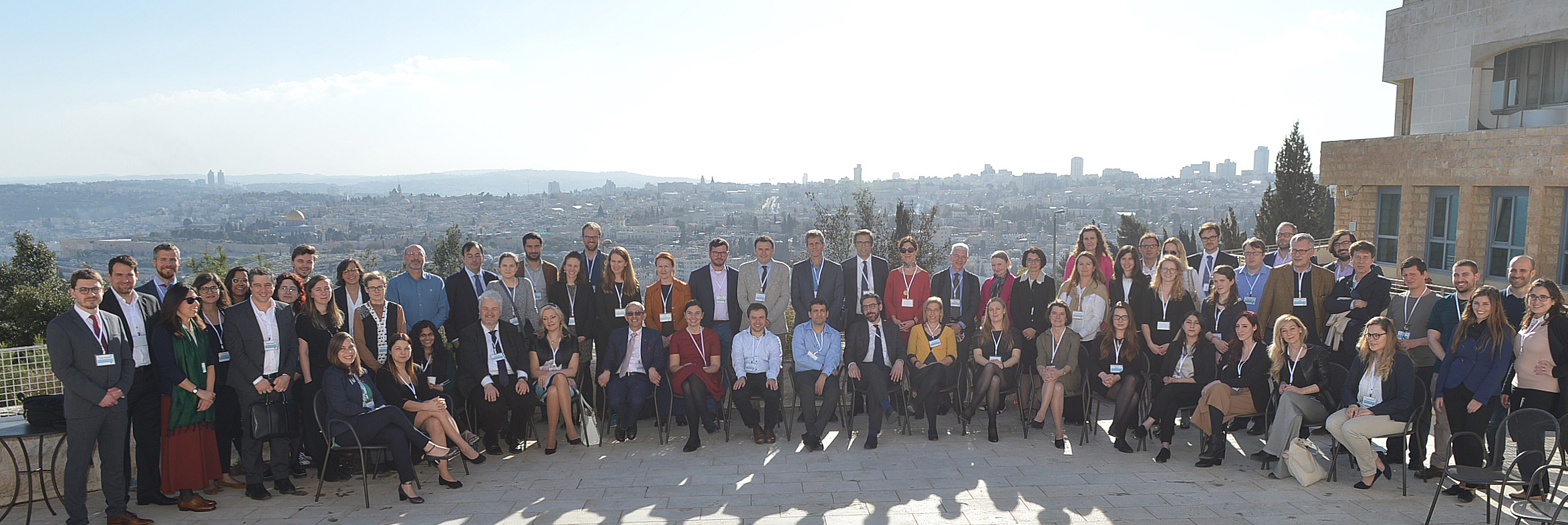
The 2018 ESIL Research Forum took place this year in Jerusalem, at the Hebrew University Faculty of Law, attracting almost 100 participants, including speakers (mostly early career academics), members of the Society, and local students, practitioners and academics. The topic of the Forum was International Law in Times of Disorder and Contestation, and many presentations dealt with problems of backlash, populism, under-implementation of international obligations, and challenges to the legitimacy of international norms and institutions. There were also more hopeful voices, including that of the keynote speaker – Prof. Basak Cali, underscoring the resilience of international law, its adaptability and its important role as an external evaluative criteria of power.
The Forum proceedings were complemented with pre-conference activities – a half-day program offered by the International Environmental Group, a study tour of East Jerusalem (organised by Ir Amim), a practitioners’ panel on practicing international law in a conflict zone (held at the Notre Dame Conference Centre and a masterclass offered by Prof. Larry Helfer on the question of exiting international treaties.. The social events offered included a dinner at the Touro restaurant in the exotic Yemin Moshe neighbourhood West of the Old City walls, and a tour of the Israel Museum.
The ESIL Board will announce shortly the location of the 2019 Research Forum.
6. First volume in the ESIL Series
The Judicialization of International Law. A Mixed Blessing? (OUP, 2018)
Edited by Andreas Follesdal and Geir Ulfstein
After a period of considerable expansion and increasing importance of international courts (ICs), several of them are faced with criticism about their legitimacy, and even backlashes. The criticism is diverse and may relate to the composition of the courts and tribunals, to their procedures, or to their legal interpretations and the acceptability of their outcome. Some of the ICs are more susceptible to such critique than others. The volume is composed to give a representative picture of the achievements of ICs, as well as the challenges they face. The sovereign freedom of well-functioning states is constrained by decisions, be it by the World Trade Organization (WTO) dispute settlement system or foreign investment tribunals. Some critics lament the circumvention of national democratic legislators and the neglect of cultural differences. The independence and professionalism of the judges are questioned, as are the effectiveness, accessibility, accountability and transparency of ICs and their procedures
The volume contains a selection of contributions presented first at the 11th ESIL Annual Conference, held in Oslo on 10-12 September 2015. The local organizer was the PluriCourts Centre for the Study of the Legitimate Roles of the Judiciary in the Global Order.
7. ESIL Reflections
ESIL Reflections offer up-to-date reflections on current issues in international law. The Reflections are now in their fourth year, covering a wide range of topics relating to current developments in international law and practice as well as theoretical reflections in a way that is relatively accessible to non-experts. The aim is to foster discussion between ESIL members and international law scholars and practitioners more generally – in Europe, but also beyond. ESIL Reflections are published monthly on this website and distributed freely to ESIL members.
The editors are Samantha Besson, Jean d’Aspremont (editor-in-chief), Jan Klabbers and Christian Tams. ESIL Members who have an interest in contributing are encouraged to do so. Please contact Jean d’Aspremont if you would like to contribute.
Latest publications:
- Regulation of Cyberspace by International Law: Reflection on Need and Methods by Emilie Legris and Dimitri Walas
- Distinguishing the Legal Bindingness and Normative Content of Customary International Law by Maiko Meguro
- The Silent Impact of the 1917 Revolutions on International Investment Law by Andrea Leiter
8. News from Interest Groups
ESIL Interest Groups are a vital part of the Society’s success and activities. A list of the groups is available on the ESIL website. Reports of recent activities and upcoming events are available in the full text of the Newsletter.
ESIL IG on International Human Rights Law
The IG will hold a pre-conference event in Manchester in September: The Universality Challenge to Human Rights Law: a Sword, a Shield, or Neither? CALL FOR PAPERS Deadline for submissions: 1 May 2018.
ESIL IG on International Business and Human Rights
The IG will hold a pre-conference workshop on the occasion of the 2018 ESIL Annual conference in Manchester: Rethinking limited liability in light of the universality of human rights. CALL FOR PAPERS Deadline for submissions: 20 April 2018.
ESIL IG on International Environmental Law
The IG organized a conference on International Law on Sustainable Development, Climate Change and Environmental Protection in Times of Disorder and Contestation on the occasion of the 2018 European Society of International Law Research Forum on International Law In Times of Disorder and Contestation, held at Hebrew University in Israel.
ESIL IG on Feminism and International Law
The IG had a successful meeting with seven papers presented at the ESIL conference in Naples 2017, under the theme Whose Global Public Goods, Global Commons and Fundamental Values?. The first panel focused on economic and social justice and queer approaches; the second panel addressed feminist approaches to the environment and the nonhuman animal; the final panel considered women’s representation and transformative potential. Panellists travelled from as far as Montreal, Malaga and London, and we enjoyed a really rich discussion, which continued into the evening at our social event. The IG did not hold an event at the Research Forum at the Hebrew University in February. However, exciting plans are underway for the Manchester Conference 2018 where we plan to hold an informal ‘world café’ discussion on women in international law and feminist futures organised jointly with WILNET; a round table with participants including Christine Chinkin, Hilary Charlesworth and Gina Heathcote; and there will also be plenty of opportunity for networking and discussion.
ESIL IG on International Legal Theory and Philosophy
The IG is delighted to announce its panel proposal for the 2018 ESIL Annual Conference has been selected. Our agora panel is on Transcendent principles and pluralism in international law: the complex, the simple, and the universal with an excellent line up of speakers. We welcome conference delegates to join us in the discussions. Details of the agora panel date and time will be released in the conference programme.
ESIL IG on International Courts and Tribunals
The IG will hold a pre-conference workshop on Access to International Adjudication in September in Manchester. CALL FOR PAPERS Deadline for submissions: 15 April 2018.
